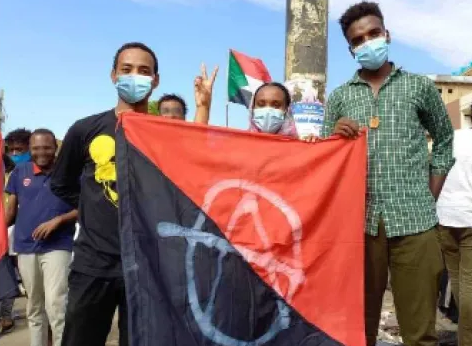
A report on the group’s contrubutions during the disastrous factional war, calling for continued support
Every day, we witness global conflicts over resources, power, and ideology, with peoples divided into camps—either supporting the existing authority in their countries or seeking to seize control of the state. In Sudan, the struggle for resources and power has long been the driving force behind conflicts, culminating in the catastrophe that befell the country on April 15, 2023. These events starkly revealed the truth behind the slogans of the December Revolution, which anarchists actively worked to clarify.
When the Janjaweed were an integral part of the military state and participated in the violent dispersal of sit-ins, comrades bravely opposed them, demanding their popular dismantling, recognizing them as a threat to the revolution and society. Later, the Rapid Support Forces (RSF) emerged as an independent power based on tribal foundations, wielding their authority and weapons to impose dominance through explicit racial supremacy. In Sudan, organised tribal conflict is visibly fuelled by the state, with ignorance serving as the primary tool for igniting division among communities for the benefit of the ruling powers.
Certainly, the war had a devastating impact on the formation of our group, as displacement and dispersion were inevitable consequences of the violent conflict in the country. However, thanks to international solidarity, we were able to rescue comrades trapped in conflict zones, bring them to safety, and assist them in adjusting to their new housing situations. We also helped others find shelter. Personally, during the war, I hosted more than three families of comrades, reinforcing the principle of solidarity until they were able to stabilise their situations.
Despite our limited resources, we exceeded our capacities significantly. Most of our comrades volunteered to serve the affected community and vulnerable groups such as children, women, and the elderly. With humanitarian aid being scarce and the crisis worsening, we had no other choice but to step up.
Additionally, it was essential to reflect the true causes, trajectory, and developments of the war from our anarchist perspective to the world. We also sought to defuse the tensions that warring factions aimed to escalate in order to fuel the conflict, by raising awareness about the nature of the war.
Another crucial aspect of our efforts was educating people about the dangers of war remnants and how to handle situations involving captivity, detention, starvation, injuries, and war-related waste.
Despite our lack of resources, we remain committed to our liberatory duty—spreading awareness in such complex circumstances. We hope to expand participation and broaden the scope of the struggle.
Today, Sudanese people are not fighting over religion or ideology but are engaged in a fundamentally authoritarian struggle. With social movements against ideology losing momentum, anarchists remain the only ones capable of offering a correct analysis and critique of authoritarian policies. As we give our utmost efforts—and possibly even our lives—to maintain our existence and spread awareness, the support of comrades worldwide is crucial.
We cannot fight this struggle alone. Just as we recognise that we are not alone in this world, international solidarity strengthens us. That is why we call on all comrades to support anarchists in Sudan—because supporting them is supporting freedom and justice against tyranny in all its forms.
source: Anarchist News